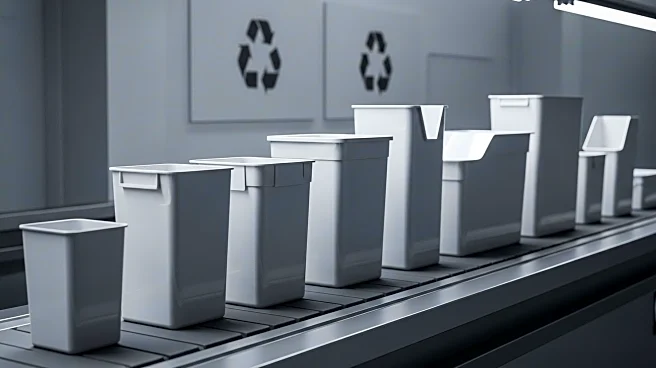What's Happening?
A proposal to standardize packaging for products within the same category is gaining attention as a potential solution to improve plastics recycling and reuse. The current state of plastics recycling is inefficient, with only 10% of plastic packaging being recycled globally. The complexity of different pigments and materials used in packaging has contributed to the collapse of recycling economics. By adopting uniform guidelines for plastic type, color, labels, and adhesives, the recycling process could become more economically viable. This approach could also facilitate the creation of a circular economy, where new products are made from recycled materials. The idea is not without challenges, as it requires cooperation from major brands, but it is seen as a necessary step to address the environmental impact of plastic waste.
Why It's Important?
The move towards standardized packaging could significantly impact the U.S. and global efforts to manage plastic waste. By simplifying the recycling process, it could lead to increased recycling rates and reduced environmental pollution. This initiative aligns with growing consumer awareness and demand for sustainable practices. Brands may face initial resistance due to the perceived loss of unique brand identity, but the long-term benefits of cost savings and compliance with emerging regulations could outweigh these concerns. The potential for a more circular economy could also drive innovation in packaging design and materials, benefiting both the environment and the economy.
What's Next?
As the concept of standardized packaging gains traction, it is likely to face both support and opposition from various stakeholders. Policymakers may consider implementing regulations to encourage or mandate such practices. Brands will need to weigh the benefits of compliance against the costs of changing their packaging strategies. Consumer advocacy groups may also play a role in pushing for these changes, highlighting the environmental and health benefits of reduced plastic waste. The success of this initiative will depend on collaboration across industries and regions.
Beyond the Headlines
The push for standardized packaging raises questions about the balance between environmental responsibility and market competition. It challenges traditional notions of branding and consumer choice, suggesting a shift towards more collective approaches to sustainability. This development could also influence global trade policies and agreements, as countries seek to harmonize standards and practices. The ethical implications of reducing plastic waste and protecting ecosystems are significant, potentially reshaping consumer values and corporate strategies.










